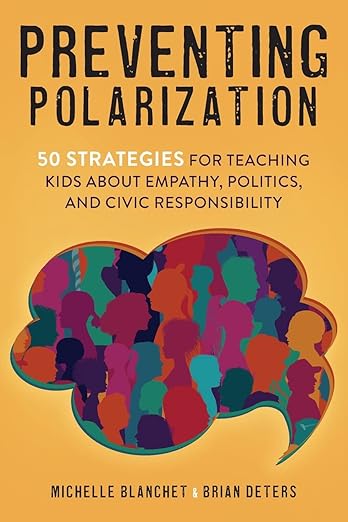6 Ways to Teach Students to Think Critically, Care Deeply, and Act Responsibly
Apr 05, 2025
![]()
It's a polarizing political world. Teachers must help kids learn how to navigate it, without stepping over the aisle.
In today’s world of social media echo chambers, partisan news cycles, and heated debates over nearly every issue, teaching kids about empathy, politics, and civic responsibility might feel like a daunting task. But it’s never been more important.
Ideally, education does more than prepare students for tests—it equips them to care about the world and empowers them to shape its future. In classrooms across the country, teachers have an opportunity—and a responsibility—to help students understand how to come together despite their differences.
Empathy, political awareness, and civic engagement aren’t just abstract ideals. They’re skills. They can be taught, practiced, and nurtured. By fostering these abilities, we prepare students not only to succeed in their personal lives, but to lead our communities, heal divisions, and tackle big problems with courage and compassion.
Here are some strategies to help educators bring this essential work into the classroom:
1. Cultivate Critical Thinking
Kids are naturally curious, but curiosity needs direction. Teach students how to question what they hear, read, and see. Encourage them to ask: What’s the evidence? What’s another perspective? What might be missing here?
Use current events to teach them how to analyze arguments and think through problems. Whether they’re evaluating a political speech or discussing a controversial law, students should learn how to think critically rather than react emotionally. When kids know how to ask the right questions, they’re less likely to fall into groupthink and more likely to develop informed, independent opinions.
2. Digest Information and Consider the Source
In the age of misinformation, it’s vital that students learn how to identify credible sources. Help them become media-literate by teaching them how to fact-check stories, recognize bias, and separate opinion from fact.
Have students compare how different news outlets cover the same story. What’s emphasized in one version that’s ignored in another?
Empathy grows when students are encouraged to see the world through someone else’s eyes.
What kind of language is being used, and how does it shape the reader’s opinion? These lessons can help kids become responsible consumers of information—and more thoughtful participants in political discussions.
3. Understand the Impact of Their Actions
Civic responsibility starts with the realization that your actions matter. Even young students can grasp the idea that their words and decisions affect others—whether it's the way they treat a classmate or how they contribute to their community.
Give students real opportunities to make a difference. Organize service-learning projects, classroom elections, or advocacy campaigns on issues they care about. Whether they’re writing letters to local officials or raising awareness for a cause, these experiences show kids that they have power—and they can use it for good.
4. Explore Tough Conversations
Empathy grows when students are encouraged to see the world through someone else’s eyes. Role-playing activities, literature circles, or historical simulations can help students understand different perspectives and lived experiences.
Teaching empathy, politics, and civic responsibility doesn’t mean pushing a particular agenda.
Create a classroom environment where tough conversations aren’t avoided—they’re welcomed. Establish clear norms for respectful dialogue and make space for students to explore identity, justice, privilege, and oppression in age-appropriate ways. When kids learn how to disagree respectfully and listen actively, they build the tools for lifelong civic engagement.
5. Make Group Work the Norm
Group projects aren’t just about completing a task—they’re about learning to work with others, especially people who think differently. Regular collaboration teaches patience, compromise, and shared responsibility.
Rotate group members often so students experience diverse perspectives and communication styles. Use reflection questions like “What did we do well as a team?” or “What could we improve next time?” to help students grow not just academically, but socially and emotionally.
6. Speak Up, Step In, and Get Involved
Kids need to know that they have a voice—and that it matters. Teach them to speak up when they see injustice, step in when someone is being left out or mistreated, and get involved in issues that are bigger than themselves.
Whether it’s through student government, volunteering, or simply noticing and helping someone who needs it, students can learn that civic responsibility isn’t just about voting when they’re 18. It’s about showing up, standing up, and participating in their communities every day.
The Final Word: Teaching With Hope
Teaching empathy, politics, and civic responsibility doesn’t mean pushing a particular agenda. It means helping students care—about themselves, about others, and about the future we all share. In a world that often emphasizes division, classrooms can become places of unity, where young people learn to bridge differences, solve problems, and build a better world together.
The future lies with our children. Let’s give them the tools to make a difference, minimize conflict, and build a more connected, compassionate society—one conversation, one activity, one lesson at a time.





